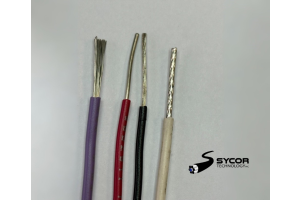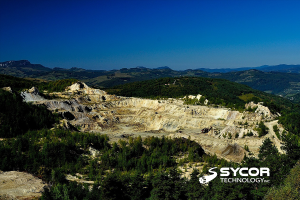Understanding High-Temperature Wire — Common products and their uses:
Teflon and silicone are among some of the most popular insulating compounds within a wide range of different markets. The wire and cable market is no different, having Teflon and Silicone insulated wire being used for many different types of applications. Typically these reliable insulations are used in applications that involve cooking and drying equipment, household and industrial ovens, aircraft and petroleum processing, aerospace applications, and others where the temperature exceeds 150°C.
Insulated Teflon Wire & Cable
Teflon is a unique product that was developed by the organization "Dupont," in 1938. Teflon as an insulator is very reliable in hook-up wire and mil-spec wiring applications but is best known for its ability to perform in high-temperature settings reliably. Unlike the silicone alternatives, Teflon wire and cable can withstand up to 450°C consistently. This durability is only possible because the fiberglass is created using a Teflon high-temperature finish. This is how many of the TGGT, TCGT, and MGT constructions generate their durability, but also lose their flexibility.
Teflon Wiring Applications
Teflon has a wide range of different applications, and as discussed before, they're typically used in general hook-up wire, military, or high-temperature applications. The durability is the most desirable factor about these cables as they're able to survive in temperatures reaching up to 450°C. Generally, the Teflon is used in applications that require heat resistance, corrosion resistance, and friction or wear resistance. Some applications that Teflon is relied for on include automation and robotics, air conditioning, navigation, power steering, and heated seats within automobiles. With strong, durable constructions, Teflon insulated wire and cable is ready to take on any even the demanding application settings
Different Teflon Grades (ETFE, PTFE, FEP)
Teflon initially was created with one basic form, but as time has passed and technology's advanced, the evolution of Teflon has slowly continued to develop.
Different Teflon Types:
PTFE: Polytetrafluoroethylene
FEP: Fluorinated ethylene propylene
ETFE: Ethylene tetrafluoroethylene
PFA: PFA is a "co-polymer product of PTFE. The co-monomer perfluoroalkyl vinyl ether interferes in the crystallisability and molecular weight to achieve good mechanical properties and melt processability without sacrificing thermal performance and chemical resistance" (Fluorocarbon).
![]()
Insulated Silicone Wire & Cable
Silicone wire is similar to Teflon in the context of temperature and voltage ratings but is unique in plenty of other ways. Silicone is one of the most flexible cables that can perform within harsh high-temperature applications. The increased flexibility enables these cables to be used in difficult-to-reach locations and areas that may be subject to consistent maintenance. The flexibility that silicone offers is unique and lets electrical personnel use different methods for figuring out how to make a specific application into a reality. Silicone is additionally resistant to ozone, weathering, and aging, as well as UV radiation and radioactive rays.
![]()
Silicone Wiring Applications
Silicone, as an insulator, has plenty of unique features that help the designated cable fulfill its requirements within specific applications. Flexibility in high-temperature environments is one of these unique benefits that silicone exemplifies. This increased flexibility is why SGI cables can be used as a hook-up wire in high-temperature applications. Being able to fit in tight locations and withstand moderate handling enables these cables to be used in application settings that not many other cabling products can. Silicone insulation is also available as a designated fiberglass high-temperature wire, specifically with the different SEW and SRML constructions.
Teflon vs. Silicone Conclusion
Overall, both Silicone and Teflon cabling products are perfect for a wide range of applications, be it as a general-purpose hook-up wire or a highly resistant cable subject to consistent handling and maintenance. Understanding when and where to use the multi-purpose cables helps not only save your budget but can make the set-up and maintenance of the intended applications increasingly easier. When it comes to Silicone and Teflon insulated wire, both have similar and different benefits, which allow these different constructions to serve a great number of applications in a variety of different markets.
For more information about us:
Call Toll Free - 1.800.268.9444 or Email Us - [email protected]





